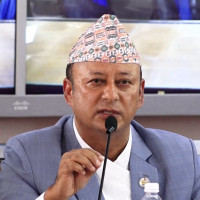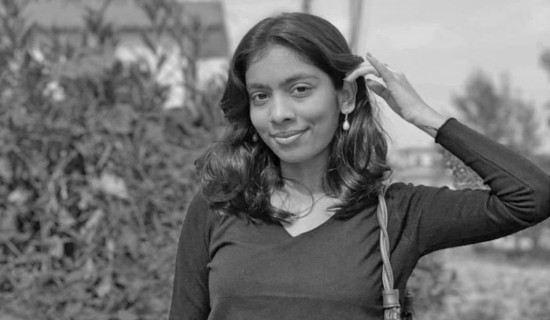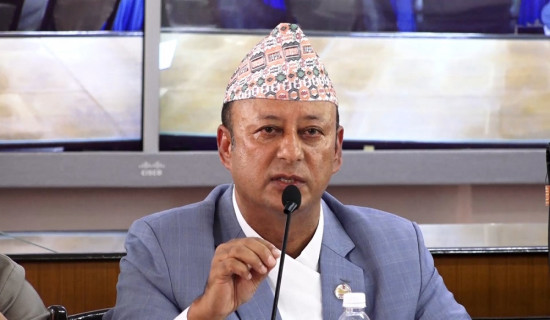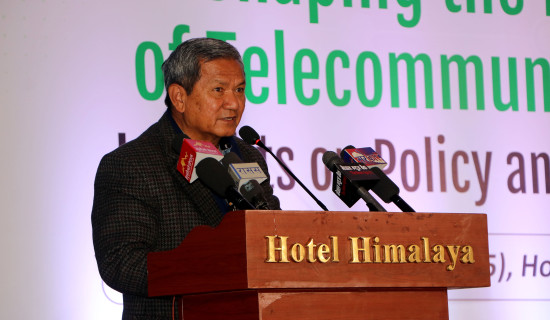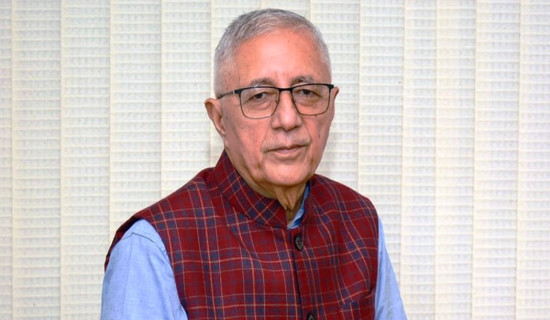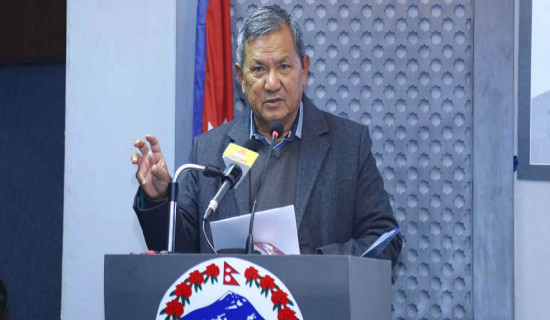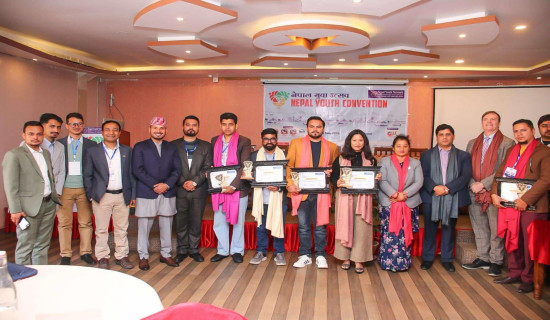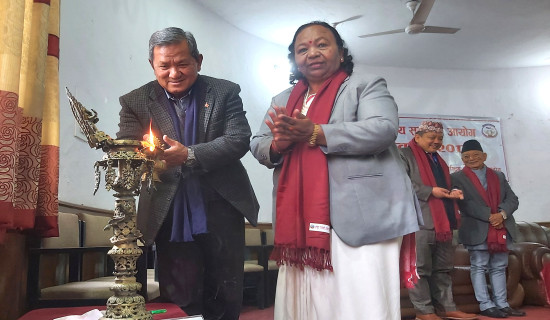- Friday, 21 February 2025
Govt will move ahead overcoming inequality, poverty and corruption: PM Oli (With full text)
Kathmandu, Feb 19: Prime Minister KP Sharma Oli has said the incumbent government would move ahead by removing the challenges of inequality, poverty and corruption prevailing in the society by making democracy transparent and more accountable.
Addressing a function organized on the occasion of the National Democracy Day-2081 at The Army Pavilion, Tundikhel today, he made it clear that the government's policy was to take the country towards prosperity by empowering the youth.
"Over the seventy-five years since the end of 104 years of autocratic rule, despite many ups and downs, we have begun moving from poverty to prosperity, from a developing to a developed nation, and from inequality to equality in the light of democracy," the PM said on the occasion.
According to him, democracy is the foundation for Nepal's graduation from least developed country status by 2026 and for improving economic indicators to ensure sustainable development. "We are utilising every moment, possibility, and capacity towards achieving Sustainable Development Goals by 2030. Through this, we will succeed in fulfilling our national aspiration of ‘Prosperous Nepal, Happy Nepali’," he added.
The full text of the Prime Minister's address to the 75th National Democracy Day celebration main programme is as follows:
Address by the Right Honourable Prime Minister KP Sharma Oli
on the Occasion of the 75th National Democracy Day
7th Falgun 2081 (19 February 2025)
Right Honourable President,
Right Honourable Vice President,
Right Honourable Chief Justice,
Right Honourable Speaker of the House of Representatives and Right Honourable Chairperson of the National Assembly,
Honourable Deputy Prime Ministers and Ministers,
Honourable Members of the Federal Parliament,
Heads of Diplomatic Missions and Distinguished Guests,
People’s Representatives and Civil Servants,
Respected Sisters and Brothers,
7th Falgun! This day holds the utmost significance in the lives of us Nepalis. It is the day when, through a struggle marked by immense sacrifice, we elevated ourselves from mere subjects to the status of sovereign citizens.
On this glorious and historic occasion, first and foremost, I extend my heartfelt felicitations to all democracy-loving Nepalis on the 75th National Democracy Day.
I pay my deepest tribute to the immortal martyrs, including Shukraraj Shastri, Dasharath Chand, Dharma Bhakta Mathema, and Ganga Lal Shrestha, who sacrificed their precious lives in the battle against the tyranny of the Rana oligarchy.
Some dates hold special significance in the history of Nepal's democratic movement—Chaita 26, Baisakh 11, Jetha 15, and Asoj 3. These days mark milestones in the abolition of the party-less system, and securing the constitution that enshrines democracy, republicanism, and federalism. Each of these days successively empowered the people, expanding their rights.
However, among all these historic days, the most epoch-making one remains 7th Falgun!
7th Falgun 2007! A turning point in Nepal’s history, this day reminds us of the harrowing yet courageous journey that led our forebears from the dark night shackled by the cruel chains of autocratic rule to the warm dawn of freedom, driven by their own conscience.
7th Falgun recalls an entire century lost. While the world was leaping forward with scientific advancements, Nepal was shackled by the whims of hereditary rulers. It reminds us of a time when a single irrational decree of the oligarchic ruler could amputate the hands of gifted individuals striving for innovation. It recalls the agonizing memories of those who dared to speak the truth having their tongues cut out, their eyes gouged, and pioneers of innovation being subjected to caste demotion.
7th Falgun!
This day brings to mind the era when citizens could only leave their homes or return at the sound of the bugle blown from the rulers' courtyard. It reminds us of a time when Nepalis had to obtain a ‘visa’ to enter their own capital, Kathmandu. It echoes the brutal past when hundreds of citizens were reduced to mere serfs, forced into labour under the diktats of despotic rulers, just so their legitimate and illegitimate heirs could erect grand palaces.
In the older era of our history, there was a time when kings were chosen through running competitions. However, this day also reminds us of the conspirators who manipulated even these races to seize power and ensure the rule remained within their own lineage, revealing their ugly faces of deception.
Thus, 7th Falgun did not merely change the form of governance; it laid the foundation of a civil administration by replacing arbitrary appointments with a merit-based system. It marked the beginning of planned development and established diplomatic ties with friendly nations on the basis of sovereign equality.
Overall, 7th Falgun advanced the firm struggle for the country’s complete independence and sovereignty.
Thus, we celebrate 7th Falgun as Democracy Day. We pay homage to the supreme sacrifices of our martyrs. We recount to the new generation the tales of struggle, hardship, and sacrifice endured by our ancestors to secure a brighter future for them.
For today’s generation, raised in the light of democracy and accustomed to accessing online services through cutting-edge information technology, the tyranny of the past is not a lived experience—it is merely a story!
Therefore, for the emerging generation, this day is an unforgettable one!
At times, as generations pass, society, basking in the warmth of a free day, tends to forget the chilling memories of the darkest nights of history. It even questions, ‘What has democracy achieved? It still sustains the very palaces built during the Rana era!’
The hereditary rulers built palaces for their offspring,
Democracy built roads, bridges, irrigation canals, electricity, commercial trade centres, hospitals, and schools for the people.
Can the structures created for the aristocratic luxury of autocratic rule and those built by democracy to transform citizens’ lives be objectively and factually compared?
Today’s generation must assess this not through misplaced comparisons but with rational judgement!
Having emerged from the darkness of autocratic rule and embraced democratic rights, our society has made significant strides in infrastructure development. Social security provisions have expanded. Progress has been made in social justice. Society, once shackled by authoritative chains, is now connected to the network of information technology. Through this, it has reached the highway of unrestricted freedom of expression.
I am confident that the reasoning of those travelling this highway of freedom cannot justify the necessity of authoritarian chains.
Over the seventy-five years since the end of 104 years of autocratic rule, despite many ups and downs, we have begun moving from poverty to prosperity, from a developing to a developed nation, and from inequality to equality in the light of democracy.
A nation’s prosperity is directly linked to the happiness, satisfaction, and well-being of its people.
The journey towards prosperity continues uninterrupted.
I define the prosperity of the country and people’s happiness’as––‘comprehensive democracy’. Conventional democracy advocated only for ‘freedom of organisation and expression.’ Comprehensive democracy ensures equal access for all to ‘rights and opportunities, equality and social justice, security and dignity.’ Prosperity is holistic development, and happiness is the easy fulfilment of an individual’s rightful human and biological needs.
We are moving towards this goal with sincerity.
Amidst rising public aspirations and growing challenges, we are advancing in a synchronized manner, aligning institutional and state capabilities to meet evolving demands.
Our youth are the future of the nation. Startup initiatives have been launched to provide them with education, healthcare, employment, and entrepreneurship opportunities. Empowering the youth is the government’s policy to lead the nation towards prosperity.
Progress in people’s lives has been achieved under democracy, however challenges remain.
By making democracy more transparent and accountable and by eliminating inequality, poverty, and corruption, we will overcome these challenges.
It is due to the light of democracy that today we have been able to initiate swift public service delivery through digital means, which has begun making government services more efficient and transparent.
Democracy is the foundation for Nepal's graduation from least developed country status by 2026 and for improving economic indicators to ensure sustainable development. We are utilising every moment, possibility, and capacity towards achieving Sustainable Development Goals by 2030. Through this, we will succeed in fulfilling our national aspiration of ‘Prosperous Nepal, Happy Nepali.’
The 7th of Falgun shall continuously inspire:
All Nepalese to take pride in their history,
To diligently fulfil their responsibilities in the present, and
To capitalise their accountability towards the future as a form of social wealth.
Finally,
The 7th of Falgun is also a day to honour the valiant heroes who dedicated themselves to the unwavering struggles of the past for the establishment of the democratic rights of the Nepali people. It is a day to reaffirm our commitment to realising the aspirations of the people, working toward national prosperity and well-being as envisioned through those struggles for democracy.
On this historic occasion, as we commemorate the day that abolished the autocratic and despotic system and established citizens' rights, I once again offer my heartfelt tribute to the immortal martyrs who gave their invaluable lives for Nepal’s democratic movement. I earnestly call upon all my fellow sisters and brothers to unite and contribute to realizing our national aspirations for good governance, development, prosperity, and the well-being of the people through an effective and orderly system of governance.
Thank you!
(RSS)

.jpg)






